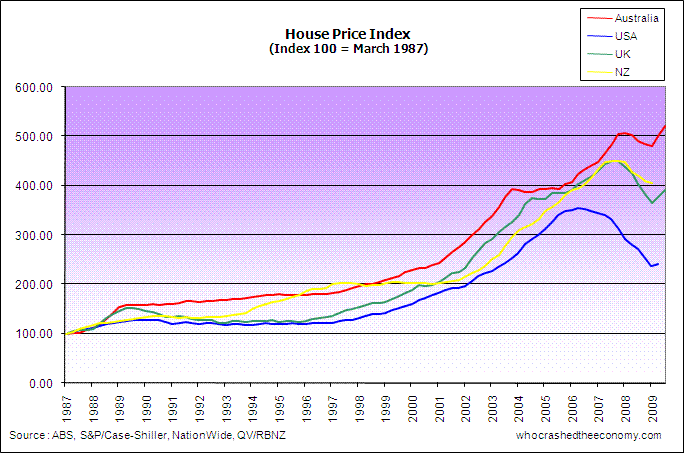The next housing boom has begun, outstripping wages and further reducing household spending, which ultimately will put further pressure on unemployment as purse strings continue to tighten.
Economists had predicted house prices would rise 3% for this quarter, but ABS data released today show a much larger boom in house prices. Australian house prices surged 4.2% in the September quarter setting a new all time peak for prices.

It was low interest rates that first triggered the bubble in house prices resulting in the current Global Financial Crisis. The Reserve Bank must now rapidly hike interest rates from emergency lows to a more normal footing of around 5%.
» House prices jump – again – The Sydney Morning Herald, 2nd November 2009.

It’d be nice if those graphs could be produced vs median incomes. I know Steve Keen does a similar series.
One thing that always interest me is that the gradient spike in periods such as 2001-04 is so much higher than now, but rarely was anybody in that over-exuberant climate shouting about overpriced property. Maybe because wage inflation were catching up and there were also tax benefits taking effect that benefited investors.
What nobody seems to get is that wage inflation can only go so far (esp with AUD becoming stronger) before Australia’s exports will be priced out of the rest of the world and we’ll suffer an effectively self imposed recession to right us.
How are sales volumes?
Can’t help wondering if these are prices high b/c of bubble action – multiple bids, crowds of fools cashed-up with big-bank easy debt – or b/c of sales volumes decreasing leaving prices skewed to the higher end of the market?
Typically in a collapsing bubble, you’ll get a ‘last-gasp’ price peak just before the crash. (Happened with housing in the US and UK in 2007/08.)
If this price peak is bubble action due to more pulled-forward demand (which high sales volumes would show), then we can probably expect a few more legs up as the government continues its property-propping stimulus, while the lagging downward forces of unemployment and rate rises are postponed for another quarter or two.
It won’t last much longer, either way, but the fall will be hard enough as it is when it gets here. All Rudd is doing with this stimulus rubbish is protecting the big banks, who are the ones ultimately buying these properties.